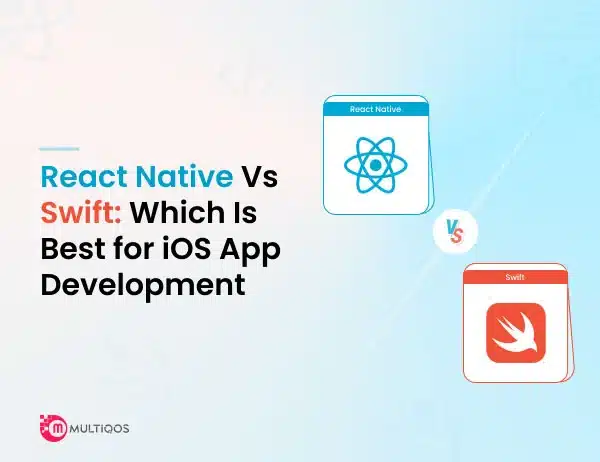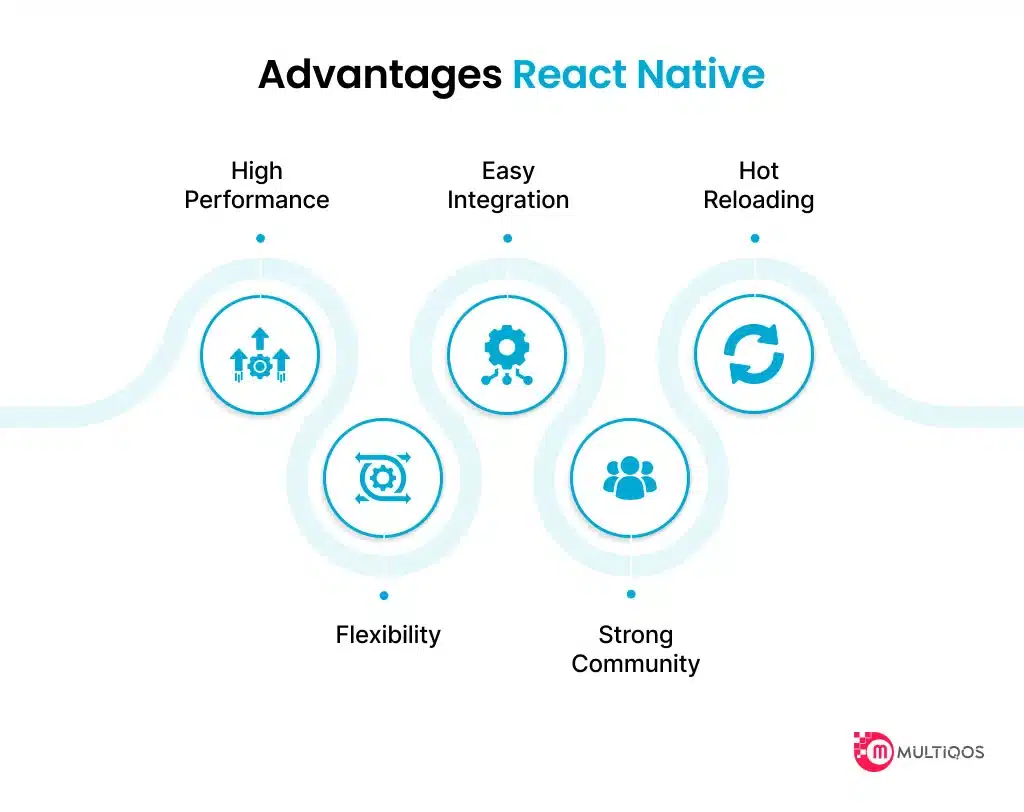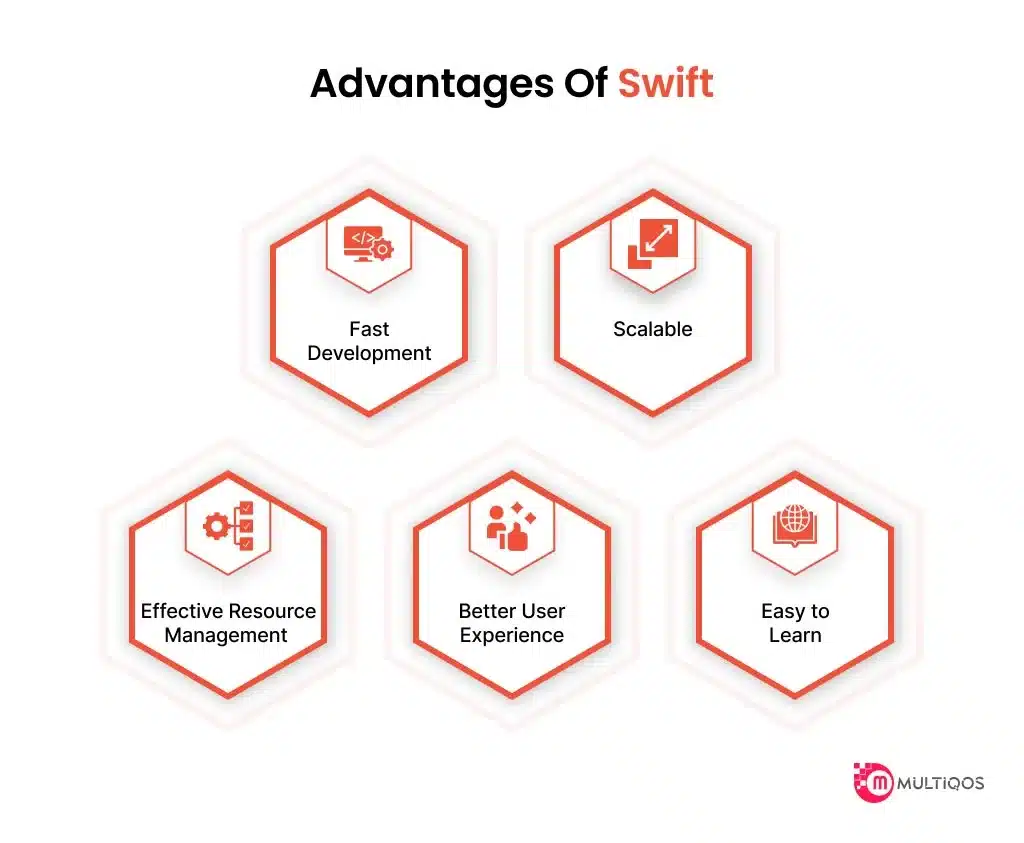React Native vs Swift – Which is Best for iOS App Development in 2025?

Mobile applications have become the primary weapon for businesses to engage with potential consumers with better user experience. The statistical report published in Statista reflects the same, as per the data collected in Q4 of 2023 global consumers spend about USD 70 billion on mobile apps. This shows the importance of having mobile apps and how they became a primary revenue-generating option for businesses.
Owing to a large user base and stiff market competition, choosing a multi-platform approach will help reach a diverse audience with your mobile app where native approach delivers unparalleled performance. However, to leverage more from the mobile application, choosing the right mobile app development platform and hiring mobile app developers is important.
When it comes to developing a mobile application, the choice would be simple either building a native performance or cross-platform. So, the debate for picking the top app development framework would be either React Native or Swift iOS.
This article illustrates the differences between React Native and Swift for iOS app development that every developer and business owner should be aware of. Also, it provides you the experts’ guidance on when to choose react native development and Swift app development for what type of project.
What is React Native?
React Native is one of the most admired JavaScript-based app development frameworks for developing exceptional cross-platform mobile applications. This cross-platform app development framework allows mobile app developers to develop native-like applications.
Developers mostly prefer this app development framework as it easily bridges the JS code with the native components for building remarkable mobile apps. Building applications in this React Native platform is highly efficient and easy for react native app developers.
Advantages React Native
- High Performance – React Native uses native controls and modules that enable developers to build mobile apps with high efficiency and outstanding performance. The usage of Native APIs and separate threads in coding ensures the app’s performance is maintained at a high level.
- Flexibility – React Native programming language comes with a modular architecture that promotes coordination between coding and easy-to-update without any hassles. In addition, the framework supports code reusability and encourages module re-usage; this makes the platform more flexible.
- Easy Integration – Integrating with the existing web technologies is easier in the React Native platform. React Native frameworks share similarities with the popular JavaScript library – React, which facilitates developers to integrate existing web through code reusability.
- Strong Community – React native has a well-established strong community with active members around the world. This creates an ecosystem where developers can easily get coding assistance and extensive documentation.
- Hot Reloading – React Native allows developers to modify the codes and preview them in real-time. Hire react native developers to validate innovative ideas quickly and iterate according to the feedback.
Disadvantages: React Native
- Complex Design – Maintaining the guidelines of Apple’s iOS and Android OS platforms is challenging while developing applications in React Native. This makes the React Native framework complicated for developing complex design apps.
- Lengthy Testing Process – Though the app development time is faster, testing the developed app takes much time in React Native. The possibility of error occurrence or bug after the deployment is high in React Native.
- Dependency – Developers sometimes need to depend more on native modules or features to build apps in React Native. This forces developers to understand native coding to work on React Native.
- Licensing & Patent Challenges – React Native is owned by Facebook and it possesses the full rights over it. This allows Facebook to take any action on licensing the framework at any time.
- Capability and Stability – React Native is still an evolving and under-development platform. This makes the capability and stability of the platform not fully established.
What is Swift?
Swift is the best multi-paradigm, compile-time programming language developed by Apple for developing mobile apps compatible with all Apple platforms. Developers prefer using Swift for developing fully native applications for iOS and macOS.
The interactive programming interface and advanced features of Swift enable developers to build apps with all safety and modern features. Swift uses easily understandable syntax that allows swift developers to build coding easily and quickly.
Advantages: Swift
- Fast Development – Swift has a clear and understandable syntax that encourages developers to build applications at rapid speed. With the automatic reference counting feature, developers can handle memory usage efficiently and improve app performance.
- Scalable – Hire swift developer to add new features and modify codes of the existing app without any hassles in Swift. This makes it a scalable platform for creating highly scalable apps to meet the user’s demands at any time.
- Effective Resource Management – Swift uses Automatic Reference Counting (ARC) which tracks down the engaged memory and releases it automatically. This ensures the app performs at a high level through effective resource management.
- Better User Experience – Apps developed in Swift can be installed quickly and it accesses only less memory ensuring no lacking performance. This led to a better user experience for app users.
- Easy to Learn – Swift uses simple syntax and it is specifically by keeping newbie developers in mind. With easily understandable syntax, the learning curve becomes much easier for new programmers.
Disadvantages: Swift
- Limited Community Support – Unlike other popular programming languages, Swift doesn’t have a strong and large community. Swift continues to expand; this indicates the platform may not have vast resources and tools just like other languages like Objective-C.
- Incomplete Cross-platform Support – Swift was specifically designed to create native mobile applications for iOS and other Apple operating software. The platform doesn’t support developers to build a cross-platform application which discourages developers from using.
- Poor Interoperability – Swift undergoes frequent upgrades and causes problems for developers to identify the right tools for performing certain tasks. Often developers face trouble with syntax highlighting, auto-completing tasks, and spotting appropriate refactoring tools and compilers.
- Version Incompatibility – Swift is known for its poor version compatibility. Frequent updates of Swift enforce developers to rewrite the coding to adapt to the latest version. To solve this issue, developers need to build a Swift Conversion tool to transfer code from one version to another.
React Native vs Swift – Comparison
Here are the crucial differences between React Native and Swift that you must be aware of before stepping into app development.
- Performance
React Native supports near-native app development with insufficient memory usage and GPU speed. This leads apps to suffer occasional Stutter or lag when running on lower-end devices.
However, Swift supports native app development with optimized memory usage. This makes apps with complex UI perform better on all devices.
- Programming Languages
React Native uses JavaScript which is a popular one among web developers with large and active community support. This helps developers to access vast resources.
Swift is an underdeveloped language with a rapidly growing community. It supports languages like Python and Objective-C that offer clean and understandable coding. This helps new developers to build complex concepts easily.
- Accessibility to Native Features
React Native users bridge modules to access limited native features like cameras, geo-location, and so on.
But, unlike React Native Swift offers direct access to the native features, which allows developers to access all native features without any hassles.
- User Experience
React Native has a flexible UI framework that allows developers to construct beautiful user interfaces and achieve a better user experience.
SwiftUI offers similar declarative user interface building just like React Native. This helps developers to achieve rapid UI development and to score better user experience.
- Productivity
The code reusability feature of React Native promotes developers towards faster development. In addition, features like hot reloading, and a vast library of open-source components play a key role in increasing developer’s productivity.
On the other hand, the declarative syntax of Swift may increase the speed of development, but the compile time of Swift slows down the development process.
Also Read: Flutter vs. React Native, Which is best?
Use Cases: Swift vs React Native
- React Native:
- React Native suits better for developing customer-facing applications.
- React Native is the most preferred framework for the rapid development of stable applications.
- React Native is the best for developers to build mobile apps with reusable components.
Famous React Native Apps: Facebook, Walmart, Bloomberg, Instagram, Gyroscope, Wix, Delivery.com, and so on.
- Swift:
- Swift is the most preferred framework for developing native iOS applications with complex design.
- Swift platform is better for developing premium apps with advanced security features.
- Apps that require continuous maintenance and regular updates for long terms can prefer using the Swift platform.
Famous Swift Apps: LinkedIn, Airbnb, Kickstarter, WordPress, Coursera, Firefox, Artsym, and so on.
When to Choose React Native?
- Apps that require expanding to new platforms in the future to reach more audiences.
- Apps development that requires quick and iterative MVP.
- For building mobile web applications with code reusability function.
When to Choose Swift?
- For building native iOS applications to run only Apple devices.
- For building apps with complex design and delivering high performance on all devices.
- To develop iOS apps using new Apple SDKs and APIs.
- Development of iOS apps which requires later expansion to Mac OS.
Conclusion
In summary, both React Native and Swift platforms promote developers to build high-quality mobile applications. However, the battle between React Native Vs Swift defines the development of Cross-platform application Vs Native iOS mobile applications.
React Native can be used for building iOS applications with limited features but the Swift platform doesn’t support cross-platform applications. As the mobile application development industry moves towards cross-platform development with code reusability and portability, React Native would be the best option for building apps to cover the maximum audience. However, if your app development requirement strictly stands on developing a true native iOS application to perform better on all Apple devices, then opting Swift platform would be the best.
This article gave you the complete analysis of React Native Vs Swift. Consider your team’s skills and ability to build apps according to the requirements for picking the best platform between React Native and Swift. Otherwise, you can hire react native developers or iOS developers from a reputed Mobile App Development Company to build your application.
FAQ on React Native vs Swift
React Native uses the most common programming language JavaScript for app development; this makes the app development process easier for developers. However, when it comes to developing complex and scalable applications Swift is the most preferred one.
Yes! Both React Native and Swift can be used in the same project. It requires some additional configuration to ensure compatibility and to deliver a more seamless user experience on both platforms. However, only experienced and skilled developers can make this complex process possible.
Unlike the Swift programming language which is a native app development platform for developing only iOS apps, React Native supports the development of cross-platform apps which can be run on both Android and iOS.
Choose the React Native framework if you want to develop a time-efficient and budget-friendly cross-platform app that helps your business reach a wider audience. However, if your project is about developing native iOS apps with complex features/functions and optimized memory usage, then choosing Swift would be the right option.
React Native uses JavaScript language that supports the coding process through web application, this results in rapid development of iOS apps when compared to iOS app development using Swift.
Unlike Swift, React Native is a Cross-platform app development framework that supports developers to build apps compatible with multiple platforms using a single codebase. This empowers developers to skip writing repetitive coding for individual platforms which promotes code efficiency and reaches the app to the market quickly.
Get In Touch








